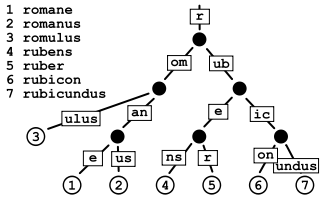これはテストされていませんが、これが私の試みです。(必要以上に複雑にしているかもしれませんが、別の見方だと思います。)
基本的な考え方は、最初の要素で一致するアイテムのグループをコンパイルし、各グループの最大一意インデックスを見つけて、連続する各インデックスで要素をチェックすることです。
int FirstUniqueIndex<T>(IEnumerable<IEnumerable<T>> myArrayCollection)
{
//just an overload so you don't have to specify index 0 all the time
return FirstUniqueIndex(myArrayCollection, 0);
}
int FirstUniqueIndex<T>(IEnumerable<IEnumerable<T>> myArrayCollection, int StartIndex)
{
/* Group the current collection by the element at StartIndex, and
* return a collection of these groups. Additionally, we're only interested
* in the groups with more than one element, so only get those.*/
var groupsWithMatches = from var item in myArrayCollection //for each item in the collection (called "item")
where item.Length > StartIndex //that are long enough
group by item[StartIndex] into g //group them by the element at StartIndex, and call the group "g"
where g.Skip(1).Any() //only want groups with more than one element
select g; //add the group to the collection
/* Now "groupsWithMatches" is an enumeration of groups of inner matches of
* your original arrays. Let's process them... */
if(groupsWithMatches.Any())
//some matches were found - check the next index for each group
//(get the maximum unique index of all the matched groups)
return groupsWithMatches.Max(group => FirstUniqueIndex(group, StartIndex + 1));
else
//no matches found, all unique at this index
return StartIndex;
}
上記の非 LINQ バージョンの場合 (List コレクションを使用するように変更しますが、どのコレクションでも構いません)。ラムダも削除します。これもテストしていないので、鋭利な器具を私の方向に向けないようにしてください。
int FirstUniqueIndex<T>(List<List<T>> myArrayCollection, int StartIndex)
{
/* Group the current collection by the element at StartIndex, and
* return a collection of these groups. Additionally, we're only interested
* in the groups with more than one element, so only get those.*/
Dictionary<T, List<List<T>>> groupsWithMatches = new Dictionary<T, List<List<T>>>();
//group all the items by the element at StartIndex
foreach(var item in myArrayCollection)
{
if(item.Count > StartIndex)
{
List<List<T>> group;
if(!groups.TryGetValue(item[StartIndex], out group))
{
//new group, so make it first
group = new List<List<T>>();
groups.Add(item[StartIndex], group);
}
group.Add(Item);
}
}
/* Now "groups" is an enumeration of groups of inner matches of
* your original arrays. Let's get the groups with more than one item. */
List<List<List<T>>> groupsWithMatches = new List<List<List<T>>>(groups.Count);
foreach(List<List<T> group in groupsWithMatches)
{
if(group.Count > 1)
groupsWithMatches.Add(group);
}
if(groupsWithMatches.Count > 0)
{
//some matches were found - check the next index for each group
//(get the maximum unique index of all the matched groups)
int max = -1;
foreach(List<List<T>> group in groupsWithMatches)
{
int index = FirstUniqueIndex(group, StartIndex + 1);
max = index > max ? index : max;
}
return max;
}
else
{
//no matches found, all unique at this index
return StartIndex;
}
}
